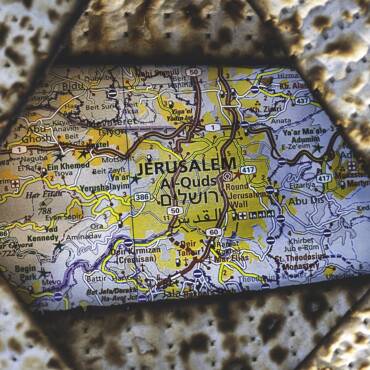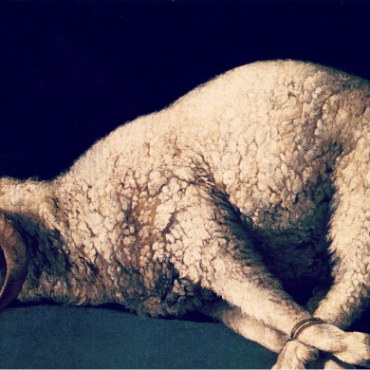God’s Promise of Plague Prevention!

Every year for the past 3,400+ years, Jewish families around the world celebrate Passover with a meal called a “seder”. In Hebrew seder means order, thus ‘the order of the meal or service’.
I will take you to Me for a people…
During the seder, those around the table will drink four times from a cup, reflecting the ‘4-fold blessing’ of redemption found in Exodus 6:6,7: “I will bring you out from under the burdens of the Egyptians, and I will rid you out of your bondage, and I will redeem you with an outstretched arm, and with great judgements: and I will take you to me for a people, and I will be to you a God.”
Judgement is Coming
Each cup is characterized by a different name: Consecration, Judgements, Redemption, and Praise. It is during the Passover seder’s second cup that the judgements or plagues are recited in remembrance of the miracles God provided for our redemption (see Exodus 7-12).
Traditionally, as each plague is mentioned during the seder, a drop of wine (or grape juice) is placed on a napkin to picture the costliness of our redemption. We remember that though after each plague Pharaoh stubbornly refused to let Israel leave Egypt, the last plague was promised by God to result in the release of God’s people.
‘Let My son go that he may serve Me’
This last plague would be the death of the first born in every home in Egypt (Exodus 11: 4-6). What a horrific and terrible tragedy! Why?
Why would there be such an awful plague? To understand this gives us insight into one of the basic themes of Scripture. The reason for the plague of the death of the first-born is found in Exodus 4 where God instructs Moses on what to declare to Egypt’s leader:
“Then you shall say to Pharaoh, ‘Thus says the LORD, “Israel is My son, My first-born”. So, I said to you, ‘Let My son go, that he may serve Me’: but you have refused to let him go. Behold, I will kill your son, your first-born’” (Exodus 4:22,23).
“Those that bless you, I will bless them…”
What Egypt had done to Israel, God’s first-born of the nations, would be done to Egypt’s first-born. What they sowed; they would reap. Judgement is fair. Egypt would not get away with their sins. Scripture assures us that “your sin will find you” (Numbers 32:23) and that “the soul that sins will die (Ezekiel 18:4).
Some may think they are getting away with their sins but eventually judgement will come. Particularly if the sin is anti-Semitism, for God promised Abraham, “those that bless you, I will bless them. And the one who curses you, I will curse” (Gen. 12:3).
God’s ‘plague prevention program’
It is only when we understand the certainty of God’s universal and righteous judgement upon sin, “for all have sinned and fall short of the glory of God”, will we then appreciate and apply God’s promise of forgiveness (see Romans 3:23)
If we miss this fact regarding judgement, God’s promise of salvation and redemption will seem irrelevant, unnecessary, even foolish. Such is the mind-set of ‘modern man.’ Never-the-less, all people are in need of salvation from judgement, or God’s ‘plague prevention program.’
The Passover Lamb
In Exodus 12, God provided deliverance from judgement for all who trusted in His plague prevention program. In Exodus 12:3 the lamb to be sacrificed was to be selected “on the tenth day of the month” and kept until “the 14th day of the month” (12:6). Why keep a year-old lamb for 4-5 days, running around your home?
It was during this time that the lamb had to be inspected to certify that it was “without blemish” (Exodus 12:5). For a flawless redemption, there had to be a flawless sacrifice. Though our people were anxious to flee bondage, it was better to have a lasting, perfect salvation than a temporary, quick escape!
The Lamb Inspected
According to Mark’s Good News account (Mark 11:11), Yeshua entered Jerusalem on the colt of a donkey around sunset on the 9th day of the month of Nisan, (commonly known as Palm Sunday). The evening would begin the new day, the 10th of Nisan, as hundreds of thousands of pilgrims in Jerusalem prepared for Passover.
At the same time each family would be selecting a lamb for sacrifice, Yeshua rode into Jerusalem, essentially presenting Himself to His people as “the Lamb of God who takes away the sin of the world.’
During the next several days, Yeshua was “inspected”: questioned, interrogated, even tortured until on the 14th of Nisan, when the head of the government declared, “I find no fault in Him” (Luke 23:22).
Yeshua was recognized to be our perfect Passover Lamb and it was only then that He could die for our redemption.
When I see the Blood…
However, it was not merely the death of the lamb that would bring redemption, then or now faith had to be exercised. This is emphasized in Exodus 12 when it says that they had to do something with the blood of that lamb: “Moreover, they shall take some of the blood and put it on the doorposts and on the lintel of the houses in which they eat it” (Exodus 12:7).
They had to put the blood on the door of their homes. Why? Only when God saw the blood, would judgement pass over that home. ‘And the blood shall be a sign for you on the houses where you live; and when I see the blood, I will pass over you, and no plague will befall you to destroy you when I strike the land of Egypt (Ex. 12:13). Redemption from judgement would come by the applied blood of the lamb.
Hebrew, Egyptian, Saint or Sinner?
Why would the Hebrews need the blood on their door? Wasn’t being one of the Chosen People enough? No. As we consider the issue there is no difference between an Egyptian and a Hebrew because all have sinned.
In modern parlance, what’s the essential difference between a believer in Messiah and a non-believer?
In both cases the difference is the application of the blood of the Lamb. Both Hebrews and Egyptians who would trust in God’s way of salvation would be saved. The choice to trust God’s way, rather than trusting in oneself— “I have my own religion”—was the issue then, as it is today.
People of Faith
God’s intention was to redeem from bondage not merely people of the flesh, but a people who would really believe Him: a people of faith. Even as the blood had to be placed publicly on the outside of the door for all to see, those who trust in His atonement are to publicly confess His redemption as well.
As Yeshua said in Matthew 10:32,33, “Therefore everyone who confesses Me before men, I will also confess him before My Father who is in heaven. But whoever denies Me before men, I will also deny him before My Father who is in heaven.”
Telling someone else about the Lord can bring a freedom and joy that many believers have yet to experience. Have you confessed Yeshua and experienced the freedom He brings?
Behold the Lamb!
Passover is a time to remember His sacrifice and our need to personally trust in Him for salvation from judgement and obtain forgiveness for our sins. If you haven’t done that yet, won’t you even now trust in Messiah Yeshua?
If you’re already a believer, rejoice! This Passover season invite a Jewish friend who needs to hear Good News to one of our seders. There, people will be invited to “Behold the Lamb of God that takes away the sins of the world” (John 1:29). That makes for a Happy Passover!




Add Comment